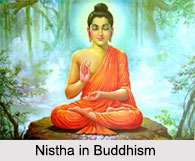 Nistha or Faith is the third section of the Dhammapada. The whole philosophy of the Buddha is based on Four Noble Truths. The Lord believed that all created things are transitory, unreal and perishable and when an individual realises this with the help of wisdom he is free from pain and it is the path which leads to Nirvana.
Nistha or Faith is the third section of the Dhammapada. The whole philosophy of the Buddha is based on Four Noble Truths. The Lord believed that all created things are transitory, unreal and perishable and when an individual realises this with the help of wisdom he is free from pain and it is the path which leads to Nirvana.
Six Orders of Nistha
It has been declared that unless an individual follows all the six requisites in a proper manner it is not possible for him to attain the ultimate stage or the Brahmana. The six requisites of Nistha are as follows:
1. The Buddha and His followers
2. The Dhamma
3. The Wise
4. The Bhikku
5. The Arahant
6. The Brahmana
The Buddha and His Followers: This section focuses on the fact that Lord Buddha had renounced everything and he had become free by destructing all sorts of craving that was present in him. Similarly the followers of the Lord are always vigilant and constantly focus their minds on Buddha Meditation, Dhamma Meditation and Sangha Meditation. All followers of the Lord constantly dedicate their minds on non-violence. It can be said that just like the Lord himself, his follower also gets delighted only at the destruction of craving.
The Dhamma: Dhamma is the second postulate of Faith or Nistha. Lord Buddha had established an order along with certain commandments for that Order. The commandments of Buddha included his advice which forbade individuals to commit sin, asked them to cultivate goodness and purify the mind. Lord Buddha called forgiveness the highest penance, and patience and long suffering as the highest Nirvana, the supreme attainment.
Later on the concept of Dhamma was taken up by Ashoka of Maurya Empire who had accepted Buddhism. Ashoka followed a religious policy of his own and is remembered by posterity for his famous policy of "Dhamma" or "Law of Piety". After converting into Buddhism, Ashoka disseminated the teachings and knowledge of the Buddhist scriptures. He always had faith in morals and principles and had high ideals in life. These came to be known as "Dhamma of Emperor Ashoka".
The Wise: The third concept of Nistha or Faith is a detailed explanation about the Wise. It has been declared in the Dhammapada that one who follows all the commandments established by Lord Buddha is a Wise man. He had said that such wise people get rid of all cravings. The Lord had described the state of such persons as: "He alone is good, wise and virtuous who neither for himself nor for others craves for sons, or wealth, or any kingdom and does not wish for his success by unfair means". Buddha believed that only such people are worthy of being called wise, good and saint.
A wise man always rejoices in the Dhamma which is revealed by the Noble. The wise man also has the capacity to control their mind. He is neither shaken by blame nor by praise. They are also able to give up all attachments. A person who is wise in the true sense considers him a fool but a fool considers himself to be wise.
The other postulates of Nistha are the Bhikku, Arihant and the Brahmana. As an individual becomes the follower of Lord Buddha he starts adhering to the path of Dhamma and as he acquires Dhamma in him, he gradually becomes the Bhikku, the Arihant and finally the Brahmana.




















